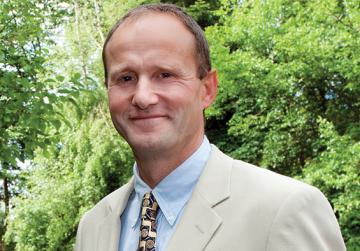New funding boosts forest and climate research and training
- Valerie Shore

How forests interact with climate change—and are impacted by it—is the focus of a new six-year, $1.6-million research and training program in UVic’s Centre for Forest Biology. The program is one of 20 projects on various topics that are being funded across the country under the CREATE (Collaborative Research and Training Experience) initiative, administered by the Natural Sciences and Engineering Research Council.
“This program will be a catalyst for climate-related research in our centre,” says UVic biologist Dr. Peter Constabel, director of the Centre for Forest Biology. “Beyond the science, it will give the next generation of forest scientists and managers enhanced training and a broader understanding of the real-world implications of forest and climate interactions.”
Forests play a vitally important role in global climate by removing carbon dioxide from the atmosphere and can store it for centuries if it is not released by disturbance or harvesting. Canada has 10 per cent of the world’s forests, making it a key player in national and international strategies to mitigate the effects of climate change. “Climate change is already happening, and the effects in Canada will be dramatic,” says Constabel. “We need to understand the impacts that a changing climate will have on our forests, and how we can adapt to this reality.”
The CREATE Program in Forests and Climate Change has three research themes: interactions of tree genetics, nutrition and health with forest management and climate chan#8805; conversion and storage of carbon compounds within forest trees; and plant-soil-environment interactions and their impact on uptake of greenhouse gases.
Under the program, 40 students and post-doctoral fellows associated with the Centre for Forest Biology will receive high-level, interdisciplinary scientific training through collaborative research projects, intensive workshops, internships, seminars and courses.
Training will build on the centre’s close linkages with scientists from the BC Ministry of Forests and Range, Forestry Canada at the Pacific Forestry Centre, forest industry laboratories, and national and international colleagues.
“We want to give our students additional skills and perspectives to equip them for careers in government and industry as well as research,” says Constabel. “And, of course, they need a broad understanding of climate change-related research.”
Established in 1990, the Centre for Forest Biology conducts basic and applied research and trains graduate students and post-doctoral fellows in forest biology. The centre represents one of the highest concentrations of plant biologists dedicated to tree research in Canada.
More information on the centre: http://web.uvic.ca/~forbiol/
Facts:
- Worldwide, more than twice as much carbon is stored in forests than is present in the atmosphere.
- Up to 50 per cent of forest carbon is stored below the ground in the roots and soil.
- BC’s old-growth forests have more carbon stored within them than almost any other terrestrial ecosystem.
- Canada’s forests are at risk from pest oubreaks, fire, overharvesting and climate change itself.

